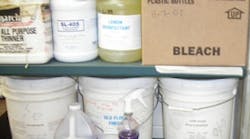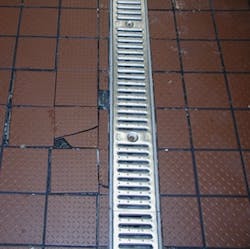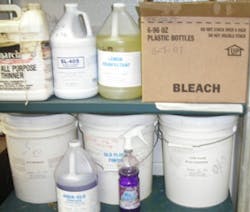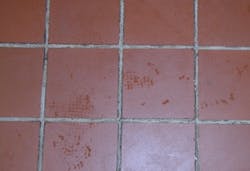Identifying the root causes of flooring failures
As an independent floor covering inspector and consultant who specializes in floor failure and root cause analysis, I know you can improve floor reliability. To avoid recurring failures in this arena, most of the time our job is to troubleshoot and determine not only “who done it,” but to get to the root cause(s) of the failure. More often than not, to determine the source(s) of failure, we must dissect the individual mechanisms that make up the floor system (assembly), which often isn’t an easy task.
But, the one pattern that seems to repeat is what’s often referred to as the “domino effect.” Fortunately, or unfortunately, one question usually leads to another question and the individual components of failure weigh on one another like a set of falling dominos. From our investigations and literature searches for information on this subject, I believe we should address the continued recurrence of deterioration and erosion of epoxy grout caused by “just simple floor maintenance.”
Time and again, we’ve found that the need for our inspections and consulting work is the result of end-user over-expectation of product, lower performance expectations and inadequate product knowledge. With advances in technology, we’ve entered into a more exciting, yet challenging and even frustrating time. Because of the focus on technologies and sustainability, advanced flooring materials are stronger, better, more chemically resistant, biodegradable and recyclable. But there are costs in terms of unforeseen conditions that complacency combined with status quo can produce naiveté and insufficient knowledge of the subject matter.
|
View more flooring content on PlantServics.com |
Epoxy grout explained
To understand epoxy grout failure, one must have an appreciation and understanding of that material. A tile or stone floor covering needs some form of joint filler (grout) to protect the tile/stone edges and to provide a protective barrier against dirt and debris. Because of its chemical resistant characteristics and durability, epoxy grout seems to have become the material of choice, especially in commercial kitchens and industrial areas subject to heavy traffic and chemical attack.The Handbook of Ceramic Tile Installation from the Tile Council of North America, Inc. (TCA) defines epoxy grout as, “a grout system employing epoxy resin and hardener portions, often containing coarse silica filler, especially formulated for industrial and commercial installations where chemical resistance is of paramount importance. High temperature, chemical resistance formulas are also available.”
Although designed to be chemical resistant and durable, we’ve found instances where, “for some unknown reason,” the epoxy grout degrades (Figure 1). This is particularly so in the food service and preparation environments, where there are concentrations of heavy grease residues. The grout either starts to come out of the joint in thick, even layers, leaving a consistently reduced grout mass, or has been so degraded that it comes out of the joint completely. This failure mode produces trip hazards, a moat filled with soiled cleaning water and a place for biological growth to accumulate.
Grout degradation allows foreign materials and bacteria to collect in the joints.
While it’s chemical-resistant and durable, epoxy grout must be treated with the same realistic respect as any other material. Believing that turning the mop bucket over to an untrained janitorial staff and the all-purpose handy floor cleaners stored in the janitor’s closet (Figure 2) isn’t going to affect the grout is unrealistic. That’s why unjustified product expectations outweigh the actual performance.
Don’t practice alchemy
Many maintenance environments, not just food service, abuse the floor covering system continually, which generates “under-performance” issues such as using the floor before the grout has a chance to cure completely, mixing non-compatible cleaning chemicals, using any type of so-called all-purpose floor cleaners, improper cleaning solution dilution ratios and inadequate floor rinsing results in cleaning chemical build-up.
To make matters worse, using hot water on epoxy grout can soften the grout, allowing it to be scrubbed out of the joint. Exposure to chemicals that are highly caustic to epoxies (such as certain non-rinse enzyme floor cleaners) and mixing different cleaning chemicals can result in high concentrations of solvents that prematurely degrade epoxy grouts. Because of repeated poor maintenance practices and the damage it causes to the grout, various associated members of the cleaning, maintenance and floor covering industries continue to study the matter to help solve this problem.
Different flooring surfaces require different cleaners. Caution: Mixing certain cleaning agents can release chlorine gas.
The science of enzyme cleaning
For both practical and commercial reasons, biotechnology is already being used in North America and Europe. Numerous commercial contract cleaners and plant mangers are now committed users of enzymes and bacterial solutions for general problem cleaning, sanitizing and viral control. As a result, enzymatic cleaning solutions are being used in a large range of industrial and commercial processes because enzymes speed up the natural process of biodegradation.
These biological products clean floors, walls, ducting and machinery of fats, grease, starch, proteins, lubricating fuel, oils, paints and even tire marks. By definition, enzymes are proteins, composed of hundred of amino acids, which are produced by living organisms. They’re responsible for a number of reactions and biological activities in plants, animals, human beings and microorganisms. They’re found in the human digestive system to break down carbohydrates (sugars), fats or proteins. The smaller enzymes can be absorbed into the blood stream.
There are hundreds of thousands of enzymes, each having its own characteristics. For example, an enzyme that can catalyze the breakdown of protein won’t react with fats and oils. Therefore, to make an effective high-performance enzyme cleaner, the formulation must contain a variety of enzymes. They outperform germicidal cleaners because they digest foreign material upon which bacteria feed. Because of this benefit, enzyme floor-cleaning products fit nicely into the “cleaning green” category and, as a result, are generally used to clean all types of floor covering materials, including epoxy grout.
Cleaning green can be mean
The science of enzyme cleaning is complex and too broad a subject matter to be covered here, but the bottom line is that one can’t say that every enzyme will harm epoxy grout. However, it’s safe to say that enzyme cleaners are designed to be used as routine cleaners, which means the surface will have multiple exposures to the cleaner. This raises questions about their suitability and compatibility with epoxy grout (Figure 3).
It’s possible that multiple exposures to floor cleaning chemicals can eat away at the grout.
As exciting as our technology advances have become, we mustn’t let our serious need to focus on our planet’s sustainability override our need for great product expectations to be matched by product performance. Now, more than ever, it’s time to stop accepting something at face value, without looking into potential shortcomings.
The question whether all enzyme cleaners are safe for epoxy grouts still remains. There haven’t been enough exhaustive studies to answer this question. Before considering or specifying their use, research the grout manufacturer’s cleaning recommendations and test the product to ensure that the particular enzyme cleaner doesn’t degrade the grout. Recently, I came across an advertisement for a green enzyme non-rinse floor cleaner that claimed the product lifts grease from grout lines. This left me wondering what else it’s lifting.
On a brighter note, there are cleaning products for epoxy grout, but get cleaning and compatibility details from the manufacturer. In addition, with the advent of nanotechnology and advances in surface-tension management in cleaning, there are alternative cleaners that, by design, offer a safer cleaning and maintenance option.
Claudia Lezell is president of the Floor Technology Institute and Inspections Too, Inc. in Friendswood, Texas. Contact her at [email protected] and (281) 286-5197.
Figures: Floor Technology Institute



